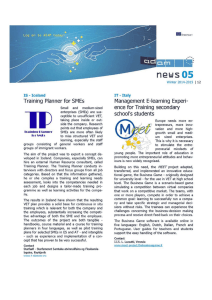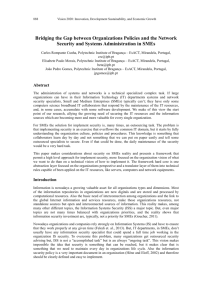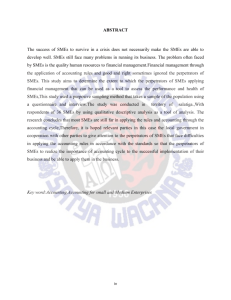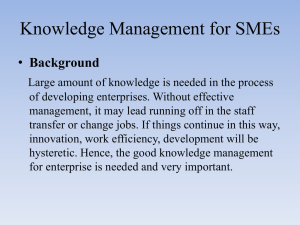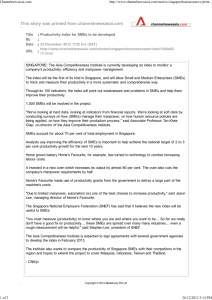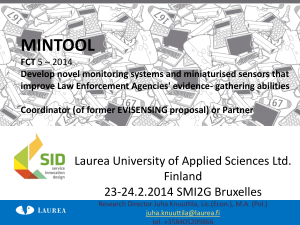presentation
advertisement
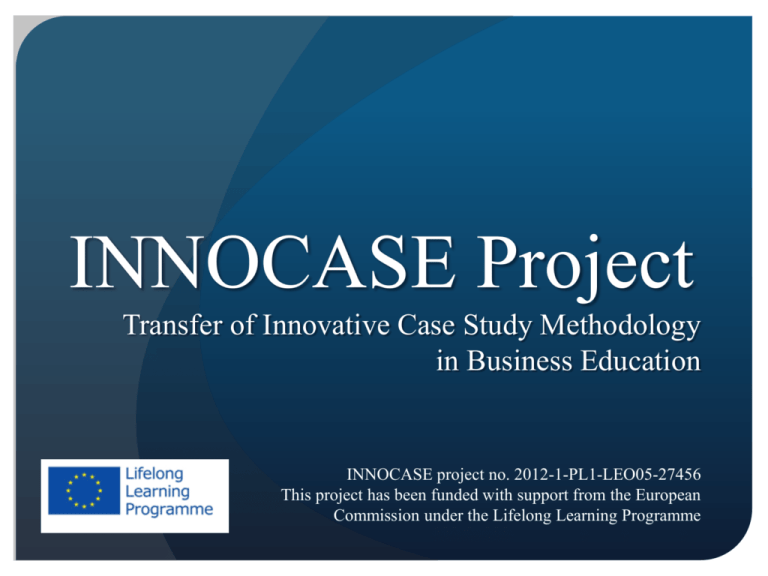
INNOCASE Project Transfer of Innovative Case Study Methodology in Business Education INNOCASE project no. 2012-1-PL1-LEO05-27456 This project has been funded with support from the European Commission under the Lifelong Learning Programme 2 Goal of the INNOCASE The main goal of the INNOCASE project is to adjust and transfer the case study methodology worked out in RePro project to the new environment – Polish and other partner countries’ business education systems. 3 The RePro methodology is designed to support knowledge and understanding in the business environment, as well as contribute to personal self-development in terms of teamwork, project management, research skills and negotiation. During the INNOCASE, this methodology will be modified to suit the SMEs environment. 4 AIMS AND OBJECTIVES The objectives of the project are as follows: 1. To adjust CS methodology developed in RePro project to the SME environment. 2. To train 15 trainers in RePro methodology devoted to case study writing on SMEs. 3. To prepare 12 real-life CS devoted to SME management in close cooperation with selected SMEs (3 per country – PL, DK, FI, CZ). 4. To transfer knowledge concerning problem-based learning between partners. 5 AIMS AND OBJECTIVES 5. To create e-learning case study pack (ELCSP) devoted to various management issues in SMEs based on the previously prepared case studies. 6. To test and improve the ELCSP according to the feedback received during the pilot testing. 7. To prepare a guideline for tutors/educators and for participants to use the ELCSP. 8. To disseminate and exploit project results via a variety of measures (e.g. project website, dissemination meetings, international conference). 9. To prepare two publications on innovative methodologies in business education. 6 Partners P0 – Gdansk University of Technology, POLAND P1 – The Municipal Federation of Savonia University of Applied Sciences, FINLAND P2 – VIA University College, DANIA P3 – Silesian University in Opava, School of Business Administration in Karvina, CZECH REPUBLIC P4 – Aiton Caldwell SA, POLAND 7 Project Coordinator Gdańsk University of Technology hundred of years of tradition, about 25 000 students at 9 faculties, regular bachelor and master programmes, wide range of opportunities to study at 7 kinds of doctorate studies and over 40 kinds of postgraduate studies, 2500 staff members, including 1200 academic teachers, GUT scientific staff engaged in numerous projects on the regional, national and international level – they participate in a great number of projects, also those financed within the Leonardo da Vinci programme, willingly cooperates with business and industry, with results on: creating interesting ventures and implementations, opportunities for students to obtain scholarships, internships and professional experience. 8 Partner 1 - The Municipal Federation of Savonia University of Applied Sciences one of the largest universities in Finland with about 6500 students, has partners all over the world and cooperates with them in international projects, coordinates/participates in international programs, including: LLP, FIRST, TEMPUS, NORDPLUS and NORTH-SOUTH, Research, development and Innovation (RDI) activities offer high-quality services and tailor-made solutions to the development needs of the businesses and work communities, RDI is done in collaboration with enterprises and organizations to solve their cross-sectoral development issues, RDI activities test new ideas, methods, products and services and promote innovation work, UAS has strong experience in implementation and co-ordination of various research and development projects. 9 Partner 2 - VIA University College Denmark’s largest university college and cover centre of all professional bachelor degree programmes offered in Central Jutland in Denmark, has more than 15,000 students a year, approx. 2,000 employees, and a revenue of DKK 1.5 billion,several of its programmes are offered in English, graduates 500-600 student a year, has cooperation-agreements with educational institutions almost all over the world and its focus is on student mobility, on cooperation between lecturers and on long-term development and research projects, VIA is a certified holder of an extended ERASMUS charter under the EU’s Lifelong Learning Programme and is also an independent staterecognised Higher Education Institution. 10 Partner 3 - Silesian University in Opava, School of Business Administraion in Karvina total of about 4 000 registered students (full-time and part-time) and 100 teachers, the School is oriented towards the education of experts in the economic, financial, social, administrative fields of study as well as computer studies, the Faculty offers the students three-step educational system taught in Czech language: In Bachelor's Study Programmes In Master's Study Programmes In Doctoral Study Programme the School is oriented internationally - open to cooperation with other universities and organizations, it also cooperates with SMEs on the local level. 11 Partner 4 – Aiton Caldwell SA Aiton Caldwell is the leader in the Polish market of telecommunication cloud services and the global supplier of a modern telecommunications platform that operates within this model of computing. It collaborates with institutions that support entrepreneurship and with universities, individual clients, as well as Platform as a Service (PaaS) to external partners. SaaS (cloud services) consists of providing business and individual clients with access to modern telecommunications services via the Internet. PaaS (cloud platform) involves collaboration with external partners whom Aiton Caldwell SA provides with access to a cloud telecommunication platform. The company belongs to organizations such as: Pomeranian Employers, Pomeranian Business Club, Pomerania Regional Business Chamber and National Electronics and Telecommunication Business Chamber. 12 The project addresses two target groups: a. trainers and teachers specializing in business education b. SMEs owners/managers & university graduates willing to start their company or work in SMEs For the first group, training in case study methodology will be prepared in order to increase their competences and skills in this field. For the second group, e-learning case study pack will be prepared and tested. 13 The added value of the INNOCASE The added value of the INNOCASE will be based on the adjustment of RePro results (with regard to content, quality and didactic approach) to target groups needs transforming them into a distance learning form and disseminating as well as exploiting within the EU. The project will contribute to the quality improvement in business education in partner countries. 14 WHY IS THIS PROJECT NECESSARY? The rationale of and the background to the project: SMEs dominate the European economy, Lack of skilled labour is a problem for more than one third of all SMEs in the EU [Guide for Training in SMEs, DG Employment, Social Affairs and Equal Opportunities], There is evidence that management training can reduce the failure rate of small firms [Management training in SMEs, OECD, 2002], SMEs tend to carry out little training [Quality in VET in European SMEs, CEDEFOP], SMEs are reluctant to external training, as they find it expensive, time-consuming, not so beneficial and not dedicated to their needs, but to the needs of large enterprises [Management training in SMEs, OECD, 2002]. 15 WHY IS THIS PROJECT NECESSARY? The project addresses a crucial need for improving qualifications of trainers/educators in the field of case study (CS) methodology applied in business education aimed at SMEs. It fills the gap of training dedicated to SMEs needs by adjusting this methodology for the purpose of training SMEs owners/managers. CS methodology, worked out in another LdV project (RePro), combines educational problems and actual business problems. Within the project, this methodology will be adjusted to SMEs context and transferred to partner countries. 16 The methodology and work plan of the project are structured around 8 work packages (WP): WP1 Preparation of transfer of case study methodology WP2 Transfer of case study methodology WP3 Creation of e-learning case study pack WP4 Piloting and testing WP5 Revision and modification of results WP6 Quality assurance and evaluation WP7 Dissemination and exploitation WP8 Project and consortium management 17 EXPECTED RESULTS Specific results that are expected in the course of the project and on its completion: 1. RePro methodology adjusted to SMEs needs 2. Training materials on adjusted RePro methodology 3. 12 case studies on SMEs 4. 12 theoretical introductions to case studies 5. E-learning platform 6. E-learning case study pack 18 EXPECTED RESULTS (2) 7. Manual for the e-learning study pack 8. Final report on piloting and testing 9. Guideline for tutors/educators on how to use the e-learning case study pack 10.Quality Management Plan 11.Evaluation reports 12.Project website 13.Dissemination and exploitation measures 14.Project management tools For more information, please visit the project website: http://innocase.zie.pg.gda.pl INNOCASE project no. 2012-1-PL1-LEO05-27456 This project has been funded with support from the European Commission under the Lifelong Learning Programme
